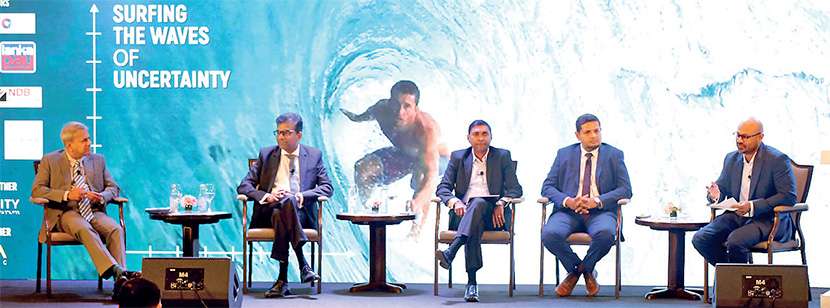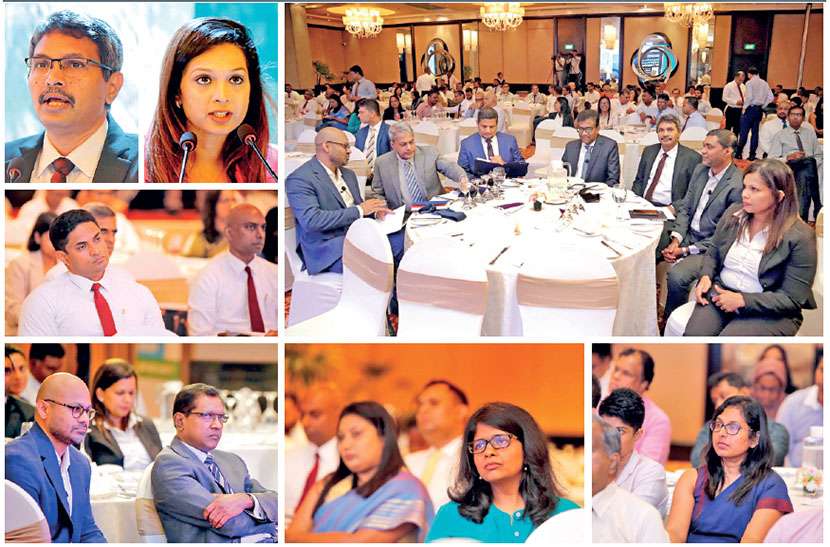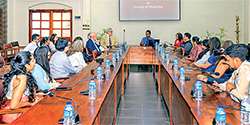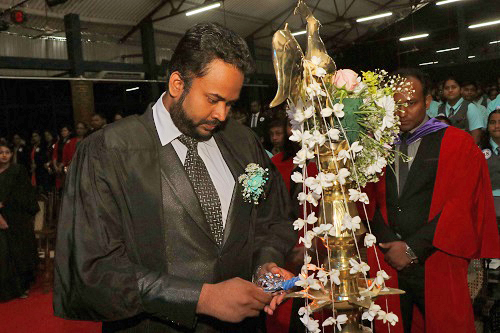CFA SOCIETY SRI LANKA HOSTS CFO FORUM ON ‘RIDING THE CHALLENGES TOWARDS THE OPPORTUNITY’

A CFO Forum organised by the CFA Society Sri Lanka was held on Tuesday, 16th July at the King’s Court, Cinnamon Lakeside, Colombo. Delivering the welcome address, President of CFA Society Sri Lanka Aruna Perera, CFA, noted that in light of the evolution of the CFO’s role towards being a critical strategic leader and decision-maker, the forum sought to create a platform for finance professionals to discuss and share insights, best practices and strategies on navigating the complexities of today’s economic environment.
The forum’s main event featured a panel discussion with Nandika Buddhipala (CFO, Commercial Bank of Ceylon PLC), Mohan Thanthirige (Group Financial Controller, John Keells Holdings PLC), Maninda Wickramasinghe (Managing Director and CEO, Fitch Rating Lanka Ltd.) and Fadhil Jiffry (Director and CFO, Sri Lanka, and Co-Head of LSEG, Finance Centre of Excellence), and moderated by Chamara Gunetileke, CFA (Senior Director, Specialized Solutions, Acuity Knowledge Partners). Commenting specifically on the banking sector, the panel highlighted the growing need for CFOs to formulate and articulate their own perspectives on strategic aspects of decision making.
They added: “CFOs need to have a point of view on capital levels; …where, when, at what cost and how [organisations] can raise capital.” Treasury management remains a vital unaddressed gap across small and medium-sized corporates. Evidencing this competency gap, the panel pointed to the lack of participation by non-banking corporates in raising long tenure financing during the low interest rate environment of 2019-2020. They suggested that should corporates lack in-house capabilities: “don’t hesitate to outsource that work. Go to an investment bank and ask them what to do.” Conversely, they encouraged financial intermediaries to proactively reach out to corporates with tailored solutions.

Speaking on risk management measures, the panel remarked that traditional stress testing frameworks used by CFOs typically account for only marginal deviations falling short of anticipating black swan events, such as the economic crisis. Therefore, CFOs need to transcend conventional risk management systems in part by being vigilant on market signals to proactively alert the CEO and board members of potential risks and seek remedial measures to mitigate negative implications on business growth. On the regulatory front, the panel drew attention to increasingly stringent compliance requirements, particularly those directed at preventing fraudulent activities, advising CFOs to stay abreast of regulatory changes and implementing necessary monitoring systems to avoid flouting the law and incurring substantial fines and reputational damage.
Moving the conversation towards environmental, sustainability and governance (ESG) practises the panel said: “The finance sector is uniquely positioned to champion sustainability initiatives, as it’s geared towards quantifying impacts.” They elaborated: “Some funding agencies where when we try to approach, they will ask what your ESG governance structure is, what your ESG strategy is, what techniques and tools are used to measure risks, and the metrics and targets. They start from this point.” Hence, it’s imperative that the CFO office integrates ESG factors into financing strategies and be able to address these questions from the outset.
On the broader topic of stakeholder management, the panellists noted the need for the CFO’s office to play an active role in nurturing a mutually beneficial partnership with investors by providing comprehensive updates in a regular and timely manner. Speaking on technology innovation the panel remarked: “The reality is… you have to balance innovation with risk management and sustainable growth.” highlighting concerns about information security and the unpredictability associated with emerging technologies, such as generative artificial intelligence. Regarding attracting and retaining talent, the panel acknowledged this to be a top-of-the-mind challenge complicated by economic volatility and currency fluctuations.

They opined that addressing the resultant brain drain requires incorporating diversity, equity, and inclusion practices to foster an environment where younger employees perceive themselves to have a fair opportunity for progress and prosperity. In their closing remarks, the panellists observed significant scope for CFOs and investment banks to collaborate in exploring financial engineering solutions to improve capital efficiency. They also put forth the idea of utilising funds to incentivise investments in ESG/sustainability initiatives, and tertiary and vocational education at a national level. The latter is especially required for the long-term scalability of Sri Lanka’s knowledge industries.









































.jpg)

.jpg)
.jpg)
.jpg)
.jpg)
